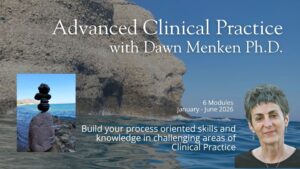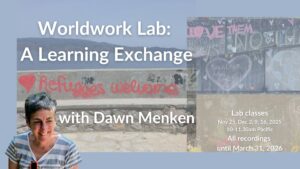Advanced Clinical Practice 2026 with Dawn Menken

Advanced Clinical Practice Series 2026 with Dawn Menken Ph.D
Build your process oriented skills and knowledge in challenging areas of Clinical Practice
6 Modules January – June 2026
This six-month course series offers a deep, experiential immersion into the Process-Oriented approach for working with the most complex and charged topics that arise in therapeutic practice. Designed for experienced therapists, facilitators, coaches, and leaders, this is not a course on entry-level techniques, but an advanced exploration of the underlying processes—the Deep Democracy—that shape human experience, conflict, and potential.
Led by Dr. Dawn Menken, a certified Process Worker, internationally respected educator, and co-founder of the Process Work Institute, you will move beyond diagnosis and pathology to become a more fluid, authentic, and skillful practitioner. Each module is dedicated to a challenging area of clinical life—from navigating complex relational dynamics and social oppression to exploring the depth of grief, addiction, and sexuality. Dr. Menken blends rich theory, practical, non-verbal interventions, live discussion, and dedicated time for inner work and casework consultation.
The course is uniquely structured to facilitate deep learning across six consecutive months in 2026, dedicating six hours of class time to each vital topic. This modular design allows participants to enroll for the entire transformative bundle for maximum growth, or on a monthly, per-topic basis for focused skill development. All classes are recorded, providing the flexibility to attend live (with Q&A and community engagement) or on-demand for continuous professional development. You will gain a powerful, non-pathological lens and the practical skills needed to transform your most challenging cases into your most meaningful work.
Six Modules, Six Vital Topics
The Advanced Clinical Practice series is structured around six vital and challenging topics in therapeutic practice:
- Your Role as Therapist/Facilitator
- Dreaming Up, Multiple Roles and Challenges of the Therapist-Client Relationship
- Working with Diversity Issues and Social Oppression
- Working with Death, Grief, Suicide and Depression
- Working with Abuse, Domestic Violence, and Addiction
- Exploring Sexuality
- Working with Kids, Parents and Families.
Dawn invites you to join one or all of the modules in the series and to co-create a learning community across borders.
Series Information
Advanced Clinical Practice 2026 includes six modules January – June 2026. Each module includes 6 training hours over three consecutive days and includes the opportunity for practice as well as theory and community conversation.
All classes livestreamed and recorded for catch up on demand.
Recordings available until December 31, 2026.
Registration Fees: $295 per Module, OR
Bundle the Series of 6 for $1,295 and save $475.
Register for the BUNDLE: Advanced Clinical Practice Series 2026
Participant Benefits
By engaging with this advanced course series, you will:
- Master the Process of Complexity: Gain an unparalleled framework (Process Work) to skillfully navigate relational dynamics, client resistance, and deep-seated systemic issues like social oppression.
- Deepen Therapeutic Presence: Learn to utilize your own subjective experiences and “edges” as crucial, conscious tools rather than sources of counter-transference or burnout.
- Find Meaning in Heavy Topics: Access the transformative potential—the “essence levels”—embedded within issues like death, grief, depression, and addiction, making your work more life-affirming.
- Work Beyond the Verbal: Sharpen your awareness of non-verbal signals, movement, and body-based communication to intervene effectively when verbal dialogue is blocked or insufficient.
- Address Social Identity & Rank: Apply process-oriented concepts of rank and power to confidently address diversity, client bias, and the impact of the practitioner’s social identity in the room.
- Expand Your Scope of Practice: Gain practical interventions for challenging areas often avoided, including sexuality, domestic violence, and family systems with children and teens.
- Engage in Advanced Casework: Benefit from theory, discussion, and dedicated time for inner work and casework consultation on your own difficult client scenarios.
- Join an Expert Community: Learn alongside a committed, international community of advanced practitioners in a confidential, supportive online learning environment.
Each Module in Detail
Module 1
Your Role as Therapist/Facilitator: Dreaming Up, Multiple Roles and Challenges of the Therapist-Client Relationship
January 28-30, 10-12 noon Pacific
This class will focus on the complexities that arise relationally between therapists, facilitators, coaches and their clients. We will explore the dynamics of dreaming up, and how they arise in what is more conventionally described as transference and counter-transference experiences.
The therapeutic relationship is the heart of clinical work, yet it is also the source of its greatest complexities. This module provides a crucial, deep-dive exploration into the relational dynamics that inevitably arise between practitioners and clients. We move beyond conventional models of transference and counter-transference to explore the Processwork concept of “Dreaming Up”. This is a powerful lens for understanding the unconscious, multi-layered dynamics that shape your interactions. You will learn to recognize when your client is relating to you as a dream figure, projection, or even a ‘ghost’ from their past, and how your own inner landscape (the therapist’s “ghosts”) is activated in return. We will explore the ethical and practical nuances of navigating multiple roles in the relationship, ensuring you maintain clarity and effectiveness even when boundaries feel blurred or stretched.
What will I learn?
- Identify and work directly with “Dreaming Up” dynamics to resolve relational blocks and deepen therapeutic insight.
- Navigate complex transference and counter-transference experiences using a practical, process-oriented framework.
- Manage and resolve the challenges of holding multiple roles (therapist, coach, facilitator, mentor) without compromising integrity or boundaries.
- Utilize your own subjective experiences as crucial information to inform your interventions, rather than feeling overwhelmed by them.
Register: Module 1 Your Role as Therapist/Facilitator
Module 2
Working with Diversity Issues and Social Oppression
February 25- 27, 2026, 10-12 noon Pacific
Issues of diversity and social oppression come up often in practice and Processwork offers a variety of useful perspectives and interventions. In addition, we will focus on client bias and bigotry and the impact of the practitioner’s social identity. We will also discuss group applications for organizational clients.
In today’s world, social issues are inseparable from personal suffering. This class focuses on providing clinicians with a robust, process-oriented toolkit for addressing diversity issues and the effects of social oppression—both internal and external—that show up in the room. We will explore how to work with the subtle and overt impacts of marginalization on the client’s self-concept and life path, as well as the potential powers.
We will explore the fluid dynamics of rank and how the practitioner’s own social identity (race, gender, class, etc.) might impact the client’s process. Furthermore, we will tackle the difficult territory of client bias and bigotry, providing safe and effective ways to meet and unfold these edges. The principles and interventions discussed will also be extended to group applications for those working with organizational change and social conflict.
What will I learn?
- Learn to utilize the breadth and depth of Processwork skills to unfold processes of marginalization to empower clients.
- Learn the skills and metaskills necessary to navigate, understand and skillfully address power dynamics and social oppression in the therapeutic relationship, as well as essential innerwork tools.
- Effectively address client bias, bigotry, and internalized oppression in a way that promotes awareness and growth rather than shame.
- Utilize your own social identity and awareness as a therapeutic tool rather than a liability in cross-cultural work.
- Adapt Processwork tools for group and organizational settings to facilitate deeper dialogue around diversity and inclusion.
Register: Module 2 Working with Diversity Issues and Social Oppression
Module 3
Working with Death, Grief, Suicide and Depression
March 25-27, 2026, 10-12 noon Pacific
Working with such heavy topics can also be life-affirming. We will explore the depth of these issues and also their potential transformative impact. Dreaming and essence levels as well as the skills that train us to focus on and unfold non-verbal communication offer tools to deepen experience.
Topics like death, profound grief, suicidal ideation, and deep depression are often labeled as “heavy,” yet they hold immense potential for transformation. This module guides practitioners on how to work with the depth and transformative power embedded within these experiences. We will move beyond a purely symptom-focused approach and learn to engage the “dreaming and essence levels” that manifest in these states. We will also touch on concepts and beliefs about death from different perspectives and belief systems and how non-local concepts and experiences of death might inform our work with people.
The class will sharpen your skills in unfolding non-verbal and movement communication, showing how to find meaning and vitality in the most withdrawn or despairing client expressions. By learning to accompany clients to their deepest edges, you will discover the unique life-affirming and consciousness-expanding impact of working with issues of mortality and emotional depth.
What will I learn?
- Identify and access the transformative potential and “essence levels” within states of deep depression, grief, and suicidal thinking.
- Utilize non-verbal cues, movement, and subtle signals as powerful tools to deepen a client’s experience and unfold meaning.
- Build competence and confidence in holding space for clients navigating intense grief, loss, or thoughts of death/suicide.
- Understand and work with the concept of the ‘Inner Critic’ and its role in self-destructive or depressive processes.
Register: Module 3 Working with Death, Grief, Suicide and Depression
Module 4
Working with Abuse, Domestic Violence, and Addiction
April 22-24, 2026, 10-12 noon Pacific
This module will support clinicians in the challenging topic of abuse and violence. Fundamental in supporting clients in their safety is to work with the inner landscape of self-abuse. We will explore the impact of culture and environment, and our own ability to meet and deal with strong emotion. Processwork brings a unique perspective to working with addictions that can be useful as well as transformative.
This challenging but essential module provides deep support for clinicians working with the raw energy of abuse, violence, and the complex landscape of addiction. A foundational focus will be on ensuring client safety by working with the client’s inner landscape of self-abuse and self-criticism, which often mirrors external patterns.
We will explore the critical impact of culture and environment on these patterns, as well as our own ability as practitioners to meet and process strong, volatile emotions without reactivity or burnout. Processwork offers a uniquely non-pathological and transformative perspective on addictions, viewing them not as mere habits but as powerful, unexpressed attempts at accessing a needed state or experience. This lens will provide you with innovative and useful intervention strategies.
What will I learn?
- Develop advanced skills to establish safety and contain volatile emotions for clients dealing with abuse and domestic violence.
- Apply the Processwork approach to addiction, seeing it as a meaningful (though distorted) signal for deep, unmet needs, experiences and states of mind.
- Intervene directly with a client’s self-abuse and self-criticism to foster inner safety and self-support.
- Enhance your personal capacity to remain grounded, clear, and effective when confronted with intense rage, despair, or trauma in the therapy room.
Register: Module 4 Working with Abuse, Domestic Violence, and Addiction
Module 5
Exploring Sexuality
May 20-22, 2026, 10-12 noon Pacific
Sexuality is often a topic that people shy away from, but is so important in our work with individuals, couples, and also teenagers. Processwork takes a non-pathological view of sexual experience in which we can focus on individual experience and the deeper dreaming processes that are embedded in our sexual expression. The class will introduce interventions for individual clients and will also focus on and explore relationship processes.
Sexuality is a core aspect of human experience, yet it is frequently met with avoidance or discomfort in therapeutic settings. This module embraces a non-pathological view of sexual experience, providing clinicians, couples therapists, and educators with the comfort and language to explore this vital territory. We will move beyond a focus on ‘problems’ to center on individual experience and the deeper, often hidden dreaming processes that are embedded in sexual expression, orientation, and fantasy.
The class will introduce powerful Processwork interventions for individual clients exploring sexual identity, experience, or difficulties. Furthermore, a significant portion of the days will be devoted to relationship processes, giving you tools to facilitate honest, deep, and constructive dialogue about sexuality within couples.
What will I learn?
- Shift your perspective to a non-pathological, process-oriented view of sexual identity and experience.
- Facilitate deep, meaningful conversations about sexuality with individuals, couples, and teenagers without shame or judgment.
- Unfold and understand the “dreaming processes” (unconscious meaning and energy) behind a client’s sexual expression or difficulties.
- Introduce practical interventions for couples to improve communication, address imbalances, and explore their shared sexual experience.
Register: Module 5 Exploring Sexuality
Module 6
Working with Kids, Parents and Families
June 24-26, 2026, 10-12 noon Pacific
This final module in the Advanced Clinical Practice series is designed to be supportive not only for clinicians and educators but also for parents seeking a deeper understanding of family dynamics. We will apply Processwork to the complex systems of parenting, family work, and our work with children and teens.
The class provides a powerful framework for addressing three different “edge arenas”—areas where challenge and growth intersect: personal edges of the child/parent, edges in the family system (e.g., communication blocks), and edges in the school or social system (e.g., bullying, peer pressure).
By recognizing these edges as potential growth points, you will learn how to facilitate sustainable change, foster resilience, and support the emergence of the unique potential in every family member.
What will I learn?
- Apply a systems-based Processwork approach to resolve core family and parenting issues.
- Identify and work with the three key “edge arenas” (personal, family system, social system) where growth is needed for children and teens.
- Utilize Processwork methods to connect with and support children and teenagers in their unique development and challenges.
- Facilitate powerful conversations that move families and couples beyond entrenched conflicts toward genuine co-creation and understanding.
- Enhanced Understanding: Gain a deep understanding of process structure, and develop the ability to notice subtle signals within a process.
- Increased Confidence: Develop confidence in working with complex processes, providing a strong foundation for working in various situations.
- Practical Application: Acquire practical skills that can be immediately applied in practice.
Register:Module 6 Working with Kids, Parents and Families
About Dawn
Dawn Menken, Ph.D., certified Process Worker, (she/her/hers) has been working in the field of psychology and facilitator development for 40 years. She is an internationally respected educator, facilitator, therapist, leadership coach, and conflict resolution specialist. She is a co-founder of the Process Work Institute, where she co-created its masters programs and served as academic dean for more than a decade. Her most recent award-winning book, Facilitating A More Perfect Union: A Guide for Politicians and Leaders, introduces new ideas to support leaders, particularly those in the public sphere. In all of her endeavors she is moved to improve social discourse and inspire more meaningful civic engagement.
Dawn is a thought leader and change agent who brings her gifts to a variety of sectors. Her parenting book, Raising Parents Raising Kids: Hands-on Wisdom for the Next Generation, offers a groundbreaking approach to parenting and has been described as “… a must read for everybody who cares about the state of our relationships and our world.” She is the creator of Teens Rise Up (TRU), a cutting-edge program that empowers and educates young people to step into their leadership, engage in honest dialogue and co-create more welcoming school communities. She is a passionate teacher and facilitator with a special devotion to relationship and building sustainable community. She is based in Portland, Oregon.
Financial Equity
PWI recognizes the global and systemic forces that unequally impact people’s opportunities to participate. If you are from an emerging economy or carrying the burden of systemic inequality and impacted by financial disadvantage, please choose the individual module equity rate ($195).
Choose the rate that is fair for you.
Use Promo Code at Checkout ADVDM2026 to access the Equity Rate for the individual modules.

















